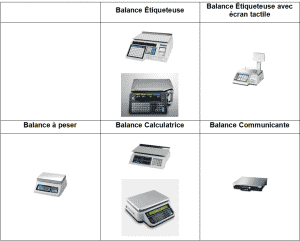Balances have existed since Antiquity, and only became true precision instruments at the beginning of the 19th century. With world trade developing rapidly, the balance has become essential and has played a key role in facilitating trade by making it more fluid and fairer.
The key and fundamental function of a scale is to weigh a good. It has been used to weigh various products ranging from gold, which due to its value requires very fine degrees of precision, to less expensive products such as food (eg fish, fruits and vegetables), certain building materials as well as products sold in bulk or frozen, and the list goes on.
How to choose the right scale? Does it have to be equipped with software? Would it be compatible with my existing system? What are the legal obligations that go with the purchase of a scale?
Choosing the right type of scale mainly depends on your needs.
There are mainly 4 types of commercial scales :
- Weighing scale: a small, compact scale that captures the weight of only one item
- Calculating scale: a scale that can calculate the price and where the prices of items can be programmed
- Communicating scale: a scale that captures the weight of an item and communicates the information to a point-of-sale terminal
- Labeling scale: A scale that captures the weight, calculates the price and prints a label for the item. Models can contain touch screens and a pole to display to the customer. Configuration can be done using software on a connected computer.
The choice of the type of scale depends mainly on the type of activity as well as the location of the scale in your business in addition to other parameters . For example, the size of your trade can have an impact on choosing the right scale. The larger the surface, the more you will need a scale that is at least calculating. This allows the customer to place the purchased item on the tray, enter the product code on the scale’s touch screen, and get a price.
If you need to print a barcode label directly from the scale, a labeling scale is the best choice. Thus, the customer will only have to affix it to the product and when checking out, the barcode will be scanned and the amount added to the total amount of his purchases. If you sell fruits and vegetables, a labeling scale can be very useful for the fluidity and transparency of the transaction. If you also have pre-packaged products, whether frozen or not, and you need to label them beforehand, this type of scale would suit you perfectly (with a very specific type of label). In addition, this scale model can be equipped with a touch screen and a pole to show the customer the real-time weight and price and many other functions.
If you want weighing to be at checkout, you’ll need a communicating scale that can connect to either your cash register or point-of-sale system. The customer will not have to weigh in and the item is weighed by the scale while the price is displayed on the cash register or POS system screen and automatically added to the purchase total.
If you just need to have the weight of a product, a weighing scale would be sufficient.
In Canada, there is a regulatory aspect to consider . All precision instruments are managed and controlled by a federal entity called Weights and Measures Canada . The latter begins by certifying to the manufacturer that the scale complies with Canadian standards. Thereafter, the end user of the scale must have it certified for weight calibration by an inspector authorized by Weights and Measures Canada every year or every 5 years depending on the type of scale. From December 15, 2022, a new standard will come into force in Canada and concerns nutritional value to be printed on the label. This new measure is applicable for certain products only. It is therefore very important to be well informed in order to equip yourself with a scale that meets Canadian standards and that is up to date to avoid any problem.
To conclude, do not hesitate to contact an expert to help you choose the right scale. The cost of a scale can be quite significant for a small business. So making an informed choice can save you money and ensure you get a scale that meets your expectations.
A “good” balance must be fair, sensitive, and faithful! (Wikipedia)

